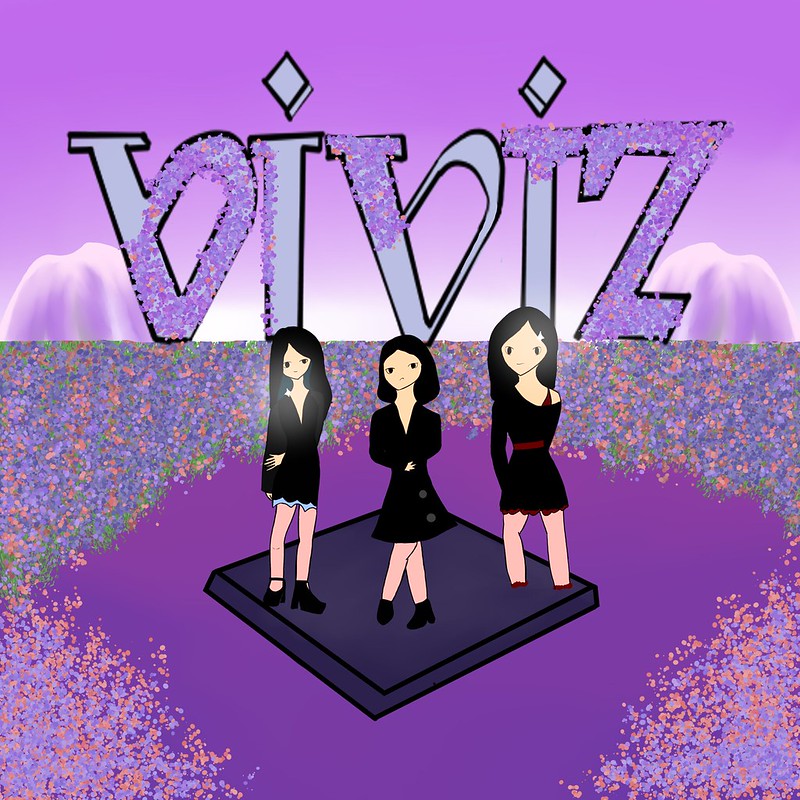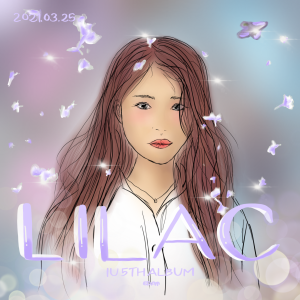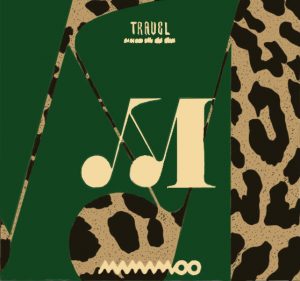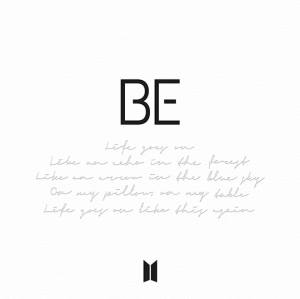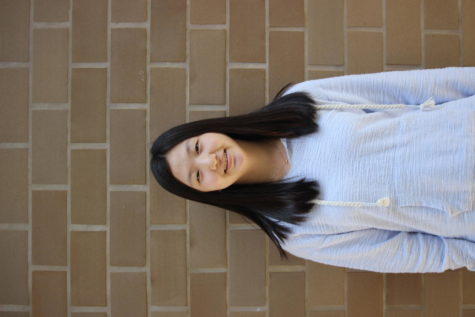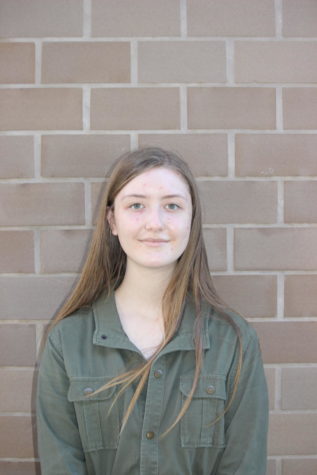VIVIZ reflects their prism-like talents with ‘Beam of Prism’
VIVIZ debuted with their multi-genre album, Beam of Prism, on Feb. 9, 2022
March 8, 2022
On Feb. 9, 2022, three members of the disbanded K-pop group, GFriend, re-debuted with their first mini album, “Beam of Prism,” under the new name, VIVIZ. Members SinB, Eunha and Umji departed Source Music following their disbandment in May 2021, signing with Big Planet Made Entertainment, where they were given the chance to re-debut as a trio under the name of VIVIZ, meaning VIVId dayZ.
The album opens with “Intro,” which is an instrumental consisting of several beats from the songs from the album, starting with an electric music style, similar to “Bop Bop!” and “Fiesta,” yet it distinctly blends into instrumentals similar to the vibe of “Lemonade” and “Love You Like” as the song progresses. As the opening song, it does a good job introducing what the songs following it can sound like, and accurately teases the songs, while not giving away the full song nor the melody.
The title song, “Bop Bop!” provides a retro-vibe song beginning with a sound that sounds like an audio being rewinded in the background. The pre-chorus subtly builds up to the chorus, then abruptly ending for a beat drop, which is immediately followed by the repetition of “Bop Bop.” The pre-chorus and the post-chorus are absolutely amazing, fitting the retro-vibe, however, the repetition of the “Bop Bop” and the beat drop ruins the moment, as well as the high note at the end of the after chorus, which reminded me too much of another K-pop girl group song, making it seem like the typical K-pop girl group song.
However, despite the chorus being too repetitive and annoying, it does fit the vibe of the song well. Additionally, the parts that are not the chorus are simply amazing, and display a genre that the members did not try during their time as GFriend. The song is a more light-hearted song, with the lyrics talking about wanting to dance and have fun without any worries, which contrasts with the theme of waiting for someone or something that GFriend had used the most in their songs. However, as successful this genre experiment was, it doesn’t seem like a good song to choose as the title song because it doesn’t display the full vocal ranges the members can take, and limits what they can display when there were so many other songs that could’ve been a better fit as the title.
“Fiesta” opens with the upbeat sound of multiple instruments playing together, then subduing as the members start to sing. The melody itself is very simple and bouncy, but is predictable, especially the instrumentals following the chorus. The pre-chorus is very upbeat and serves well as the anti-drop in the chorus. The chorus may seem a little repetitive, but the singing part of the chorus fits the general feeling of the song, which actually serves as the perfect purpose of linking the chorus to the after-chorus instrumentals.
Perhaps one of the songs that may seem the most like a “noisy” song from the album, the backtrack of “Tweet Tweet” consists of loud basses, which contrasts with the high pitched chorus that constantly repeats the words “tweet tweet” in the chorus. Additionally, the bass and the backtrack sound too loud compared to the member’s vocals, which feels like a distraction rather than an enhancement to the listener. The vocals in the chorus are a little too high pitched, which doesn’t really deliver the satisfaction of having a high melody with a loud bass, and the short “rap” part that follows the end of the first chorus sounds like the singer is fast talking with a slight melody. It is unclear if it is intentional, but it feels very out of place, and the song itself feels too experimental. To the listener, it can sound like the producers of the song tried to include too many genres into one song.
It is a huge leap going from the soundtrack and longing style of GFriend’s songs to a song that includes a lot of bass and high-pitched vocals, but the members still managed to transition well in terms of singing. However, that doesn’t necessarily mean that the song itself is a good song. It felt too experimental and complicated, and fell out of place within the album, where every other song had a somewhat dream-like feeling in the songs.
“Lemonade” starts off with a calm melody, then transitions into a song that has the bubbly 90’s vibe that many first generation girl groups in K-pop used to have. The general pitch of the song is high, and the chorus repeats the word “lemonade” too often, which makes the song seem boring and makes it seem like any other girl group song that has a bubbly concept and easily bores the listener with how easy the song is to predict. Additionally, the intro and the outro of the song is something that sounds like something that I would’ve heard before, and making it sound too generic, which is much less than what I expected from members of a very talented group.
With this song, it seems like the trio attempted the bubbly and repetitive style that many female K-pop groups tried before, which doesn’t make them stand out other than the fact that they’re from a talented group. It’s a fun song, and it’s definitely a song that you can listen to without really thinking about anything, but it sounds a little generic the minute you focus on it.
“Love You Like” recreates the feeling of falling in love with the bright backtrack with a very distinct acoustic guitar sound, and a chorus where all the members sing together a simple melody. The uplifting backtrack with the simple vocals of the members together creates a song that makes the listener look forward to a happy or uplifting event that may happen. The song creates a vibe that can only be matched by listening to it on a slightly windy spring day, or even a hot summer day with your friends, and simply makes the listener feel happier. Despite the vocals and melody being quite repetitive, it doesn’t bore the listener, but rather provides a song that anyone can listen to at any moment and reminisce good memories.
This also differs greatly from the songs that GFriend has released, but this one fits the vocals of the members so well, it feels like the song was written only for them. The acoustic backtrack really brings out the individual member’s vocals, which displays their individuality, but how it all comes together. This song is probably one of the best songs from the album, especially if you like the guitar sounds being prominent in the backtrack.
The last song of the album, “Mirror,” is the only song from the album that gives off the tv show soundtrack vibe that the GFriend songs used to have. As the last song, it seems like the members were trying to reflect on how the person they see in the mirror is the same person they were while they were in GFriend, but in a different group, under a different name. The melody conveys a longing feeling, which suits the members’ voices very well, especially considering how this is their first album after their disbandment, and that the song reflects the style of their former group.
Out of the entire album, this song is the only one that I would listen to on repeat, because the melody and the backtrack flow very well with the member’s vocals. Unlike many recent K-pop songs, which have good pre-choruses followed by a beat drop and an annoyingly repetitive melody for the chorus, “Mirror” has a harmonious pre-chorus that melts into the vivid chorus without a beat drop. Because it’s the song that most closely reflects the style of GFriend, it creates a nostalgic feeling for the fans of GFriend, especially after the first chorus, when the instrumental is the only thing that can be heard.
“Beam of Prism” offered SinB, Eunha and Umji a chance to explore many different styles of songs that are used in K-pop, while adding their own tone and uniqueness to it, as well as reflecting the style of their former group. Though some songs seemed either too repetitive or experimental, the members still adapted to it, producing a song that still handled a genre that would’ve been different from what they have been doing for the past seven years in the industry, displaying their talents of being able to cleanly manage different styles of music.

